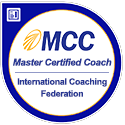

As one of the first coaches to earn the credential of Master Certified Coach through the International Coach Federation, I was invited to share my testimonial on the ICF website of what it means to me to be an MCC. I earned my MCC back in 1998 and have demonstrated the required continuing education and service to renew it three times already over the last 10 years. Fifteen years ago when I started my coaching business, I did so without a credential, but I did have 2 years of rigorous coaching education under my belt as well as a year of supervised field work. Five years into my business I proved sufficient mastery to earn the MCC.
So what? What does that mean?
It means different things to different people. For me it is about a stand for excellence and integrity in the profession of coaching. But not all coaches choose to be credentialed, and that doesn’t mean that they are any less masterful than those who have been dubbed by the ICF as a Master Certified Coach. If you are a coach, you do not need to become credentialed because the ICF says so. You should determine for yourself what, if anything, it means to you, and choose if that is the right path for you. If you want a credential, make sure you are doing it for the right reasons. Many coaches I know feel like they have to pursue a credential out of some fear of not being taken seriously or for reasons similar to keeping up with the Joneses. I know several enormously powerful, effective, senior executive coaches with fantastic business experience and coaching mastery who are not credentialed. More important to your sustainable business growth as a coach is to have solid business practices, proven results in the marketplace, and solid knowledge about what it takes to develop business. The credential is icing on the cake. In and of itself it won’t get you more clients, more money, or more respect.
Hiring Coaches
If you are someone who hires coaches, there are many other factors to consider…the most important ones being the credibility of the coach, business experience, and the ability to establish rapport. According to a recent report about coaching produced by the American Management Association, “interviewed leaders also identified “soft” traits in coaches, such as having a sincere desire and commitment to help, having adaptability and the right chemistry, being a good listener, becoming a trusted advisor, and having the ability to challenge.”
Also in the report, the authors cited Leedham’s (2005) “perceived importance of selection criteria in the order of perceived importance to the purchaser. Six main themes or factors are said to influence the selection of external coaches:
1. Evidence of having done similar coaching work previously;
2. Personal capability and relevant organizational experience;
3. The flexibility of the coach (in terms of techniques and willingness to work
with others);
4. A focus on delivering or improving business results;
5. Cost effectiveness;
6. Qualifications (including membership of professional bodies).”

